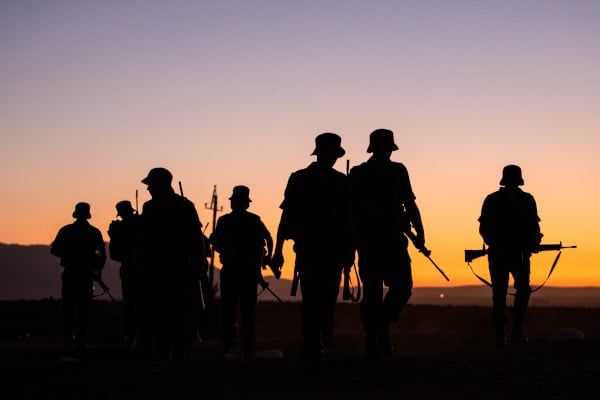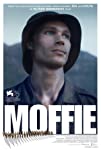Eye For Film >> Movies >> Moffie (2019) Film Review
Moffie
Reviewed by: Jennie Kermode

In 1981, South Africa was in the middle of a lengthy war with Angola, part of a larger conflict which, to many locals, felt like a siege - a rejection of colonialism and white rule which couldn't bode well for the survival of its racist regime. Young men and boys over the age of 16 were conscripted and forced through barbaric training regimes before being sent to the frontlines. As much as it was about providing soldiery, this process was about shaping the kind of men who would be willing to keep that regime going - men to whom any hint of sympathy for people of colour, Communists or he regime's other boogeymen would be seen as intolerable weakness. Built on a solid bedrock of toxic masculinity, it had no room for men who couldn't play the part.
Drawing on the same well of cultural poison as his 2011 masterpiece Beauty, Oliver Hermanus' brutal grensfliek follows the story of Nick (Kai Luke Brummer), a shy youth who has found himself on the wrong side of men who think that way in the past, and who has become adept at keeping secrets - perhaps even from himself. From the moment he's dispatched to his remote training camp he's determined to fit in. He knows how to keep his head down without being too quiet, how to go along just enough to get along, even if the Afrikaner recruits tease him at first for his English accent and delicate appearance. But he reckons without the growing attraction between himself and another recruit which could have very dangerous consequences for both of them.

There's a lot of context here that may be lost on viewers from other parts of the world. In brief, it's worth noting that the macho world of the Apartheid regime created the very enemy it feared, driving many LGBT white people to ally themselves with the black liberation movements in the struggle that would lead to today's Rainbow Nation. Furthermore, the attitudes on display here still linger in that new nation. As recently as 2012 a South African teenager died as a result of the way he had been treated in a military-style camp where he had been sent to 'cure' his supposedly feminine behaviour.
There are barely any women in this film, just worried mothers on the sidelines willing their boys to be brave, unable to understand what's really going on because no-one feels able to talk about it. Cutting the boys off from this source of support makes them even easier for the regime to control and enables it to use the idea of helpless women and children in need of protection as a means of inspiring the recruits to hate their 'savage' enemy. There is, naturally, quite a bit of use of racist and homophobic language (including the title), something that would be difficult to avoid, but far from being gratuitous, Hermanus uses it to explore the particular forms of propaganda used to prop up the state, as well as their self-perpetuating nature. Notably, he's interested in the way that hatred of the other often begins with the learned hatred of the self.
Nick is burdened with his own self-hatred and with a general sense of perplexity at a world whose rules he has learned to follow even though they make no sense. Other recruits find it harder to conceal themselves, but for the most part the film avoids simple tragic hero narratives, just as it avoids the pretence that one day it will all be over and then everything will be alright. By choosing as its hero someone who is adjacent to horror rather than, in most instances, a victim, it has the opportunity to explore more complex aspects of the psychology surrounding this kind of conditioning, together with the impact of living in fear - which, of course, mirrors the increasingly paranoid experience of the regime itself.
Brummer is the perfect choice to play Nick. His physical acting alone, carrying his character through from reticent teenager to confident-looking, fully trained soldier - is remarkable, but also important is his ability to let the audience in whilst retaining a mask of emotional restraint. The brief, tender glances Nick exchanges with the soldier who catches his eye are compelling in part because the rest of the narrative leaves so little room for honesty. Nothing more explicit is needed for Hermanus to make his point. The quietness of these moments and our awareness of the risk they entail gives them real power in contrast to the sound and fury of the sergeant, the gunfire and other trappings of military life.
Although it's hardly the first film to explore the ugliness of military training, and some of the consequences of how that training is delivered will be unsurprising to viewers, Moffie delivers something different in part because of its very strong sense of time and place, in part because it's so well put together. Hermanus is a prodigious talent and this is one of his finest works.
Reviewed on: 19 Apr 2020
















